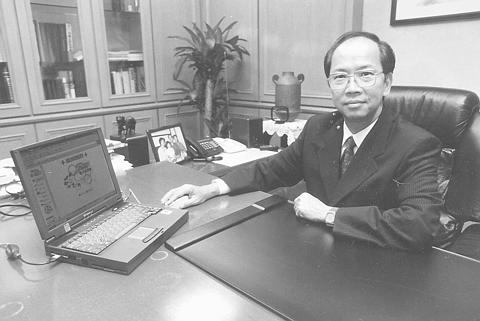His resignation as chairman of the Council of Agriculture (COA) may be the last-stand in politics for Peng Tso-kwei (
Telling reporters yesterday that he was "fed up" with politics, Peng leaves a legacy of relatively idealistic policy-making and a pragmatic approach rare at the highest levels of government.
His background -- both as an academic and a government official -- could well have influenced this approach.

FILE PHOTO
As a student at National Chunghsing University, Peng Tso-kwei was a determined and aggressive player on the sports field.
His 110-meter hurdle record remains unbeaten at Chunghsing University, and he once referred to taking up the post at the COA as an obstacle race, which requires extra strength and patience.
His venture into the political arena from the academic field was something unexpected.
Four days before the Cabinet reshuffle in 1997, Peng was given 40 minutes to make a decision that would change his life.
He decided to take a chance and become COA chairman, although the decision was later not supported by his own family.
Soon after taking up his new post, Peng established three major policy directions for the field of agriculture: production (
He said he believed that agricultural production had to be modernized to be effective, that agricultural trading liberalization was a must, and that farmers' benefits had to be well taken care of in the event of natural disasters.
Peng pushed for building resort-like farm villages, preserving endangered animals, and opposing the over-development of mountainous areas and logging.
He also suggested taking better care of older farmers, since they had contributed so much to the development of agriculture, and to respect younger farmers in order to encourage more young people to join the farming business, which has seen a rapid decline in recent years.
He also proposed adopting compensation measures to take care of farmers' losses if their rights were violated.
Peng had proposed that agricultural policy should pay attention not only to producers, but also to consumers. Peng had made it a goal to ensure that the government provided consumers with safe, quality, diverse, and hygienic agricultural products.
As for the management of farmland, Peng had proposed liberalizing the agricultural land market, to allow non-farmers to buy farm land to help the development of the industrial sector.

GAINING STEAM: The scheme initially failed to gather much attention, with only 188 cards issued in its first year, but gained popularity amid the COVID-19 pandemic Applications for the Employment Gold Card have increased in the past few years, with the card having been issued to a total of 13,191 people from 101 countries since its introduction in 2018, the National Development Council (NDC) said yesterday. Those who have received the card have included celebrities, such as former NBA star Dwight Howard and Australian-South Korean cheerleader Dahye Lee, the NDC said. The four-in-one Employment Gold Card combines a work permit, resident visa, Alien Resident Certificate (ARC) and re-entry permit. It was first introduced in February 2018 through the Act Governing Recruitment and Employment of Foreign Professionals (外國專業人才延攬及雇用法),

RESILIENCE: Deepening bilateral cooperation would extend the peace sustained over the 45 years since the Taiwan Relations Act, Greene said Taiwan-US relations are built on deep economic ties and shared values, American Institute in Taiwan (AIT) Director Raymond Greene said yesterday, adding that strengthening supply chain security in critical industries, enhancing societal resilience through cooperation and deepening partnerships are key to ensuring peace and stability for Taiwan in the years ahead. Greene made the remarks at the National Security Youth Forum, organized by National Taiwan University’s National Security and Strategy Studies Institution in Taipei. In his address in Mandarin Chinese, Greene said the Taiwan-US relationship is built on deep economic ties and shared interests, and grows stronger through the enduring friendship between

The Ministry of Transportation and Communications yesterday said that it would redesign the written portion of the driver’s license exam to make it more rigorous. “We hope that the exam can assess drivers’ understanding of traffic rules, particularly those who take the driver’s license test for the first time. In the past, drivers only needed to cram a book of test questions to pass the written exam,” Minister of Transportation and Communications Chen Shih-kai (陳世凱) told a news conference at the Taoyuan Motor Vehicle Office. “In the future, they would not be able to pass the test unless they study traffic regulations

CAUTION URGED: Xiaohongshu and Douyin — the Chinese version of TikTok — are tools the Chinese government uses for its ‘united front’ propaganda, the MAC said Mainland Affairs Council (MAC) Minister Chiu Chui-cheng (邱垂正) yesterday urged people who use Chinese social media platforms to be cautious of being influenced by Beijing’s “united front” propaganda and undermining Taiwan’s sovereignty. Chiu made the remarks in response to queries about Chinese academic Zhang Weiwei (張維為) saying that as young Taiwanese are fond of interacting on Chinese app Xiaohongshu (小紅書, known as RedNote in English), “after unification with China, it would be easier to govern Taiwan than Hong Kong.” Zhang is professor of international relations at Shanghai’s Fudan University and director of its China Institute. When giving a speech at China’s Wuhan